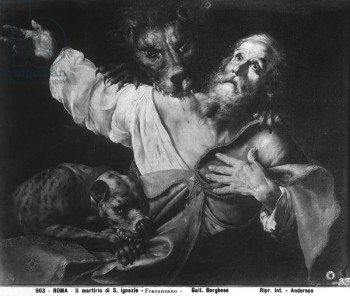Even though fifteen hundred years and vastly different circumstances distance them historically from each other, the Basque soldier and the Syrian martyr are intimately bonded by a common mystical identity. The convalescing Íñigo read about this giant of the newly born Church in the pages of Jacopo da Voragine’s The Golden Legend:
“St. Ignatius, amidst all the torments and pain of martyrdom never ceased to utter the name of Jesus. When his torturers asked him why he unceasingly pronounced “Jesus” he replied: “I assure you that this name is engraved upon my heart and I cannot but pronounce it”. After his death, they tore open his body, removed his heart and cutting it open they found within the name of Jesus written in fair letters of gold.”
Íñigo later changed his name to Ignatius and spoke of the martyr as “that glorious saint for whom I have in our Lord, or wish to have, a very special devotion filled with reverence”. The Basque soldier’s first biographer, Pedro de Ribadeneira, in his book De Ratione Instituti Societatis Iesu remarked: “His heart, like that of the ancient Ignatius, burned with love for the holy name of Jesus. Our holy father Ignatius desired to resemble this other Ignatius not merely by similarity of name but much more by similarity of life.” At the head of his maxims Ignatius of Loyola placed Ignatius of Antioch’s adage, “Jesus, my love is crucified”: all the ardent power of his love was to be so utterly given over to Jesus Christ Crucified that it would impress on his existence, as on St. Ignatius of Antioch’s, a cruciform shape of an absolute “yes” to God and an absolute “no” to the corruption of the world.
Both had personalities of fire. Through the ages, writers, using the etymology of the name Ignatius which is derived from ignis [fire], have highlighted this common dimension of their personalities. An ancient author, Romanos, in a hymn to the Syrian bishop, called him the Pyrpoloumenos, [“the one who combats with fire”]; another writer had the Emperor Severus address St. Ignatius of Antioch as «the fiery one” who burned with the “glow of divine love”. This ardor was also noticeable in St. Ignatius of Loyola who gave marching orders to his followers with the rallying call: “Ite omnia incendite et inflammate” [Go, set all alight and ablaze]
Both Saints Ignatius were men radically in love with the Lord Jesus Christ; both were men of the Mystical Body of Christ, the Catholic Church; both were mystics who measured the genuineness of their mysticism by asceticism; and both were men who poured out their lives for the salvation of souls.

